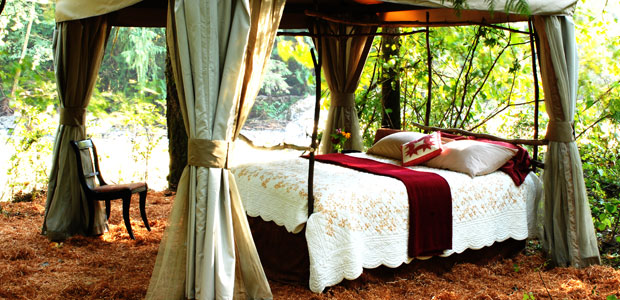Advertisement
Green Escapes
Appreciate Canada's wilderness

Not all eco-friendly holidays need to involve tent pegs, bear-proof canisters, and digging your own toilet.
Thanks to the increasing number of eco-conscious lodges now available across Canada, it is easier than ever to sleep lightly on the earth. This spring you could enjoy the silence at a solar-powered retreat in the Rockies, or soak in a wood-fired hot tub at a luxury nature lodge in the Maritimes.
Ecologically sound accommodation comes in many shades of green. For big-chain hotels it may mean simply shying away from daily linen changes and implementing a recycling program. For smaller eco-lodge operators, it means choosing to put the environment ahead of profit.
Patrick Pyrz, owner and builder of the greener-than-thou Mountain Hostel (mountainhostel.ca), chose to spend 800 days building his rustic, 10-bed lodge by hand, rather than take one-tenth of the time using heavy machinery that would impact the local environment. Situated in the Incomappleux River Valley in interior British Columbia, the lodge-cum-hostel is powered by a microhydroelectric generator placed in the same local creek that provides the site’s drinking water and keeps the refrigerator chilled. Guests are especially intrigued by his odourless composting toilet. In winter the lodge is reached by a 15-kilometre ski in along the valley bottom.
When Summer Comes
Eco-conscious travellers looking for a summer destination head to Little Slocan Lodge (littleslocanlodge.com), a stunning guesthouse on the edge of Valhalla Provincial Park in the West Kootenays, BC. It was developed by two committed environmentalists who wanted to inspire others.
Explains Ron LeBlanc, who co-founded the lodge with Alan Keane, “One of the things we wanted to do was spread the seeds of awareness about alternative building techniques.”
With the help of more than 500 volunteers, LeBlanc and Keane built the 21-capacity lodge using straw bales, salvaged materials, and nontoxic paints and oils.
A Magnet for Wildlife
Some eco-lodges have found that a sustainable approach attracts more than tourists. On the southeastern tip of Algonquin Park in Ontario, the off-grid Algonquin Eco-Lodge (algonquinecolodge.com) has become a magnet for wildlife. Guests are thrilled to wake up and find wolf prints in the snow outside.
“If you had a big hotel and you weren’t being ecologically friendly, you’d lose out on the wildlife because of the noise,” explains lodge owner Robin Banerjee, who plans to harness nearby cascading rapids to generate the lodge’s electricity.
“I think eco-lodges are a growth trend but people don’t realize that eco-friendly often means labour-intensive, and that means expensive,” he says. “People sometimes complain because you’re charging the same amount as a four-star resort when you’re definitely not four star.”
A green getaway this spring is a worthwhile investment–not just in your own health and well-being–but in the health of the planet.
Leading the Way
In Hope, BC, Sue VandeVelde-Savola co-runs Kw’o:kw’e:hala Eco Vacation Retreat (eco-retreat.com), a collection of cozy cabins on the Coquihalla River that centres on a philosophy of honouring Mother Earth. Guests are encouraged to slow down to the pace of nature, with activities such as chopping wood and melting for hours on end in the riverside hot tub. The steaming outdoor shower is stocked with biodegradable shampoos and soaps, all laundry is sun-dried (even in winter), and the wooden cabins are actually restored historic buildings embellished with cedar mill ends.
“People are coming here for the lifestyle, the peace, the food, the natural beauty of the area, and they’re coming because they want to be socially responsible,” VandeVelde-Savola explains.
Award-Winning Accommodation
Trout Point Lodge (troutpoint.com), located in the Tobeatic wilderness area in the interior of southwestern Nova Scotia, showcases The Hotel Association of Canada’s Green Key Eco-rating. Awarded the top honour of Five Green Keys, Trout Point Lodge exemplifies standards in sound energy and waste conservation, solid and hazardous waste and environmental management, indoor air quality, community outreach, building infrastructure, and land use.
Other eco-lodges have won awards for their innovations. Aurum Lodge (aurumlodge.com)–a predominantly solar-powered country inn that stands in the front ranges of the Rocky Mountains near Banff National Park–won Alberta’s first ALTO Award for sustainable tourism in 2001. It also holds the 2002 Pollution Prevention Award from the Canadian Council of Ministers of the Environment and the Five Green Leaf Eco-Rating from Audubon International.
Meanwhile, Villa Dome Quixote (domequixote.com) in New Denver, BC, picked up the 2003 environmental award from the Association of Professional Engineers and Geoscientists of BC for its domed, energy-efficient cabins constructed out of scrap wood.




